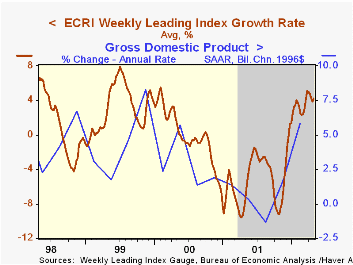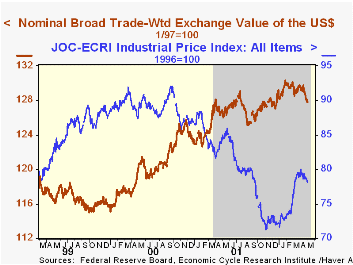 Global| May 06 2002
Global| May 06 2002ECRI Weekly Leading Index Rose Further
by:Tom Moeller
|in:Economy in Brief
Summary
The Weekly Leading Index of the US economy published by the Economic Cycle Research Institute (ECRI) rose to its highest level in a month, continuing an uptrend that began last Fall. The index is designed to signal turning points in [...]

The Weekly Leading Index of the US economy published by the Economic Cycle Research Institute (ECRI) rose to its highest level in a month, continuing an uptrend that began last Fall.
The index is designed to signal turning points in the US economy and is "real time," i.e. weekly, and not subject to significant revision.
Construction of the ECRI Leading Index is quite different from the Index of Leading Economic Indicators published by the Conference Board. Nevertheless there has been an 80% correlation between the annual percent change in the two over the last 20 years.
The components of the index are money supply plus stock & bond mutual funds, the JOC-ECRI industrial materials price index, mortgage applications, bond quality spreads, stock prices, bond yields, and initial jobless insurance claims.
The median lead of the ECRI index at business cycle peaks has been 10.5 months and at cycle troughs 3.0 months. The sideways movement of the leading index in 2002 may or may not signal something about the economy's growth rate.
| ECRI | 4/26/02 | 4/19/02 | Y/Y | 2001 | 2000 | 1999 |
|---|---|---|---|---|---|---|
| ECRI Weekly Leading Index | 122.2 | 121.7 | 2.8% | -5.0% | 0.8% | 2.4% |
by Tom Moeller May 6, 2002

The trade weighted value of the US dollar fell nearly 1% last week as mixed economic news convinced US markets that Fed tightening was not near at hand. The dollar is down roughly 1.5% from its February highs.
Commodity prices, another "market based indicator" of monetary policy, also fell. The JoC-ECRI Industrial Materials Price Index is down 2.4% from the highs set in early April. Crude oil prices are down 5.5% from the high and metal and textile prices also are down.
Versus this past Fall, the dollar is up 2+% and commodity prices are up 9+%.
Tom Moeller
AuthorMore in Author Profile »Prior to joining Haver Analytics in 2000, Mr. Moeller worked as the Economist at Chancellor Capital Management from 1985 to 1999. There, he developed comprehensive economic forecasts and interpreted economic data for equity and fixed income portfolio managers. Also at Chancellor, Mr. Moeller worked as an equity analyst and was responsible for researching and rating companies in the economically sensitive automobile and housing industries for investment in Chancellor’s equity portfolio. Prior to joining Chancellor, Mr. Moeller was an Economist at Citibank from 1979 to 1984. He also analyzed pricing behavior in the metals industry for the Council on Wage and Price Stability in Washington, D.C. In 1999, Mr. Moeller received the award for most accurate forecast from the Forecasters' Club of New York. From 1990 to 1992 he was President of the New York Association for Business Economists. Mr. Moeller earned an M.B.A. in Finance from Fordham University, where he graduated in 1987. He holds a Bachelor of Arts in Economics from George Washington University.






